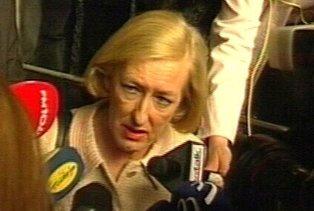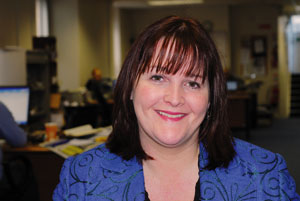A dearth of Madam editors

Geraldine Kennedy's retirement as editor of the Irish Times last Thursday, 23 June - to be replaced in that role by Kevin O'Sullivan - along with the loss of another female editor, NoirIn Hegarty, with closure of the Sunday Tribune earlier this year, has brought into focus the dearth of women in senior editorial positions in the Irish print media. What does the loss of two prominent women editors mean for Irish newspapers? Do women have different ideas about what constitutes news? And why is it that women find it difficult to succeed to editorial positions in Ireland? Christina Finn investigates.
Recent statistics compiled by the International Women's Media Foundation (IWMF) show that two-thirds of senior management jobs in the global media are held by men - though women hold 41% of writing and editing jobs.
Studies make it clear that women and men have different viewpoints on what is important in the news, and therefore the news agenda can be affected by gender balances in the media. Men and women have different life experiences, different upbringings and different interests, so it is not wildly inappropriate to say that a male editor of a top newspaper may have a different focus as to what is newsworthy.
According to Mary Maher, the editor of the Irish Times's 'Women's First' page in the 1960s, women were "discovered in Ireland in 1969" by the then news editor Donal Foley. Following Maher, an array of successful women journalists worked for the Irish Times - amongst them Maeve Binchy and Christina Murphy. Anne Stopper, author of Monday at Gaj's: The Story of the Irish Women's Liberation Movement, says women journalists used their influence in their publications to depict the concerns of women. She writes that they held "a mirror up to the public face that reflected hypocrisy and cruelty where women were concerned."
It is notable that back then women journalists were more often than not assigned to write only about 'women's issues'. This, fortunately, has since changed.
Issues such as abortion and lesbianism were first dealt with by the women writers of the 'Women's First' page. It was an important outlet for these issues - issues that up to then had been largely if not entirely ignored. It was an opportunity for the Irish people, not just women, to take a hard look at the hidden issues in Ireland.
 With further austerity cuts coming down the line, women are likely to suffer the toughest hardships. Of course men are suffering hugely, but too often these cuts affect women disproportionately.
With further austerity cuts coming down the line, women are likely to suffer the toughest hardships. Of course men are suffering hugely, but too often these cuts affect women disproportionately.
With the loss of women in editorial positions, will the female voice be lost in the mainstream news? Or have we come full circle, where women's issues are no longer 'women's issues' but are of concern and interest to men? One hopes that issues that affect women directly will be given the attention they deserve, regardless of who is sitting in the top seat.
However, David Weaver, who has investigated gender in newsroom cultures for over two decades, suggests that women are compromising themselves by not applying for managerial and editorial positions. "Women do not seek to hold positions of power as frequently as their male colleagues...some women reject offers to hold senior positions because they prefer to enjoy a relaxed personal life," he says.
University of Alabama Professor Wilson Lowrey says that for women to work in the media environment they are forced to accept 'male values'. In order to succeed in the newsroom environment he suggests that women disengage from their gender in order to attempt to be seen as equal. "Many professional women solve this contradiction with statements such as 'First of all, I am a professional,' in other words they attempt to avoid belonging to any gender," he says.
Women's values in the communications industry can be used to enhance the profession, says Romy Frohlich, a Professor at Ludwig-Maximilians-Universität München. She maintains that characteristics such as empathy can be an advantage in the media. While Lowrey says women are forced to take on male attributes to succeed, Frohlich suggests that women's characteristics are good for the news media.
Frohlich says, however, that women could be forced into a "fixed corset" as a communicator; good at interacting with people and empathising with them and thus being assigned subjects deemed "appropriate" for their gender.
Sue Douglas concurs. As former executive editor of the UK Sunday Times she refused to be confined to covering "women's interests" - when asked if she was interested in editing You Magazine she answered no, saying: "That's what you give to a woman."
But if women's issues are to be championed by women - the people who are in fact experiencing them - there may be bad news ahead. Statistics show that while many women enter into journalism in their twenties, there is a huge fall-off in women journalists when they hit child-bearing age. Reuters foreign correspondent Anna Sebba has said that "too many women are still put off by what they perceive as the cut-throat nature if the business, which they fear would be incompatible with personal and domestic responsibilities." When journalist Ginny Dougary asked Andreas Whittam Smith, former editor of the UK Independent newspaper, why top jobs were filled by men, he replied: "if a woman drops a day's work to spend time with her family, her career prospects are likely to suffer." Indeed, Irish journalist Jennifer O' Connell wrote recently in the Sunday Business Post that she resigned as editor of the news website theJournal.ie in part due to family considerations, ones that were "aged three and two". (Jennifer O'Connell was replaced by Susan Daly as editor.)
Women can succeed to top editorial positions in Ireland - Geraldine Kennedy and NoirIn Hegarty are proof of that. But there is a cost, and as a woman something has to be sacrificed. Women in the Irish media are equal to men in their capabilities. But if a woman wants it all, it appears she has to sacrifice something. As Sue Douglas says: "The woman who gets the job of editing a broadsheet will have to be a 'man'".
Christina Finn is a freelance journalist who has completed a Master's thesis on Gender Negotiation: An Investigation into the succession of Irish women into editorial positions in Ireland.
{jathumbnailoff}
